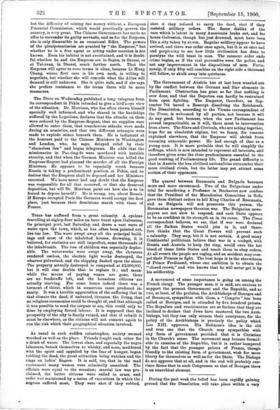As usual in such sudden catastrophes, society seemed wrecked as
well as the place. Friends fought each other for a drink of water. The lowest class, and especially the negro labourers, betook themselves to whisky, and soon, maddened with the spirit and appalled by the fear of hunger, began robbing the dead, the great attraction being watches and the rings on ladies' fingers. It is said, too, that in the mad excitement many women were criminally assaulted. The officials were equal to the occasion; martial law was pro- claimed, the better citizens were called to arms, and order was maintained by a series of executions in which the negroes suffered most. They were shot if they robbed,
shot it they refused to carry the dead, shot if they resisted military orders. The fierce dislike of the race which is latent in many Americans broke out, and for hours Galveston, though but just drowned, must have been like a city taken by storm. Regular soldiery appear to have arrived, and there was order once again, but it is at once sad and perplexing to see how little civilisation has done to paralyse the wild beast in man. The moment order ends crime begins, as if the real preventive were the police, and not any improvement in the dispositions of men. Fortu- nately, if only fifty will combine on the right side a thousand will follow, or skulk away into quietness.






































 Previous page
Previous page